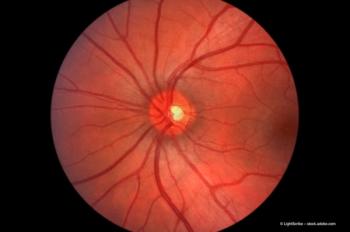
Ocuphire Pharma and Opus Genetics announce merger
The company also announced it will seek a strategic partner to continue development of APX3330, an oral small-molecule inhibitor of Ref-1 for the treatment of non-proliferative diabetic retinopathy.
Ocuphire Pharma Inc. today announced the all-stock acquisition of Opus Genetics Inc., a clinical-stage gene therapy company focused on inherited retinal diseases (IRDs).
According to a news release, the deal positions the combined companies as a key player in the development of gene therapies for treating IRDs. Following the merger, the combined company will be renamed Opus Genetics Inc., effective 23 October 2024, and will trade on Nasdaq under the ticker symbol IRD beginning 24 October 2024.1
George Magrath, MD, who will continue to serve as CEO of the combined company, stated that Opus Genetics has developed a promising pipeline of transformative therapies for patients with inherited retinal diseases, backed by encouraging early data.
“This is an opportunity to accelerate these treatments, with four major clinical milestones on the horizon in 2025 for the combined company,” Magrath noted in the news release. “We are particularly motivated by the new six-month LCA5 proof-of-concept data, which showed visual improvements in all three patients with advanced disease, and we are eager to bring together a leadership team with deep expertise in potentially groundbreaking gene therapies. We look forward to making progress, creating value, and improving patient outcomes together.”
Ben Yerxa, Ph.D., former president and CEO of Opus Genetics and current president of the newly combined company, remarked that the merger could significantly impact the company’s pipeline.
“With Ocuphire’s late-stage ophthalmic drug development and regulatory approval experience, combined with our resources, we believe we are well-positioned to advance our pipeline of potentially transformative gene therapies for inherited retinal diseases,” Yerxa said in the release. “This transaction is a win for patients with IRDs globally, and we are excited to efficiently progress our combined pipeline.”
According to the news release, the newly merged company has expanded its pipeline to include several promising assets from its adeno-associated virus (AAV)-based gene therapy portfolio. These assets target inherited retinal diseases (IRDs) and include Phentolamine Ophthalmic Solution 0.75%, currently under evaluation for the treatment of presbyopia and dim (mesopic) light vision disturbances (DLD) after keratorefractive surgery. Given the capital demands and developmental timelines for APX3330, an oral small-molecule inhibitor of Ref-1 for non-proliferative diabetic retinopathy (NPDR), the company plans to seek a strategic partner to advance this late-stage programme. In the meantime, it will redirect resources toward its newly acquired gene therapy programmes.1
The company’s most advanced gene therapy candidate, OPGx-LCA5, is being developed to treat LCA5, an early-onset retinal degeneration. An ongoing open-label, dose-escalation Phase 1/2 clinical trial has demonstrated early proof-of-concept, with new six-month data showing visual improvements in all three adult patients with late-stage disease who participated in the trial.
Jean Bennett, MD, PhD, scientific co-founder of Opus Genetics, highlighted the potential impact of OPGx-LCA5 on patients.
“This level of efficacy in patients with late-stage disease is exciting and supports the potential of a one-time treatment with OPGx-LCA5, which could be transformative for individuals who have suffered devastating vision loss and have no alternative treatment options,” Bennett stated in the news release.
The first paediatric patients are expected to enrol in the Phase 1/2 trial in the first quarter of 2025, with initial data anticipated in the third quarter of 2025. The programme has received Rare Paediatric Disease Designation and Orphan Drug Designation from the U.S. Food and Drug Administration (FDA), making it eligible for a priority review voucher upon biologics license application (BLA) approval.
Bennett, Yerxa, and Adrienne Graves, Ph.D., all of whom previously served on the Board of Directors of Opus Genetics, will join the Board of the newly combined company. Bennett, who is the scientific co-founder of Opus Genetics and was the founding scientist at Spark Therapeutics, pioneered the use of viral vectors to deliver transgenes to specific retinal cells and led the first team to demonstrate the proof-of-principle for ocular gene therapy. Yerxa, co-founder of Opus Genetics and former CEO of the Foundation Fighting Blindness, helped establish the Foundation’s Retinal Degeneration (RD) Fund. With over 30 years of experience in biotechnology and ophthalmic drug development, Yerxa has successfully translated scientific breakthroughs into clinical progress. Graves, the former CEO of Santen Inc. and chair of Iveric Bio, currently chairs the RD Fund’s board.1
According to the news release, the combined company has extended its cash runway until 2026, a period during which it expects to achieve several clinical milestones. These include data from paediatric patients in the OPGx-LCA5 Phase 1/2 trial, as well as initial results from the OPGx-BEST1 Phase 1/2 trial, and the ongoing LYNX-2 and VEGA-3 Phase 3 trials. Both the LYNX-2 trial, which focuses on patients with reduced visual acuity in low-light conditions following keratorefractive surgery, and the VEGA-3 trial for presbyopia, are actively enrolling participants, with top-line results expected in early and mid-2025, respectively.
As part of the acquisition, Ocuphire issued 5.2 million shares of common stock and 14,100 shares of convertible preferred stock to Opus Genetics' existing stockholders. These convertible preferred shares will convert to common stock pending approval at Ocuphire’s 2025 annual stockholders' meeting. Post-issuance, Ocuphire’s pre-acquisition stockholders will own approximately 58% of the combined company’s fully diluted capitalisation, while Opus Genetics’ pre-acquisition stockholders will hold around 42%.1
Newsletter
Get the essential updates shaping the future of pharma manufacturing and compliance—subscribe today to Pharmaceutical Technology and never miss a breakthrough.




























